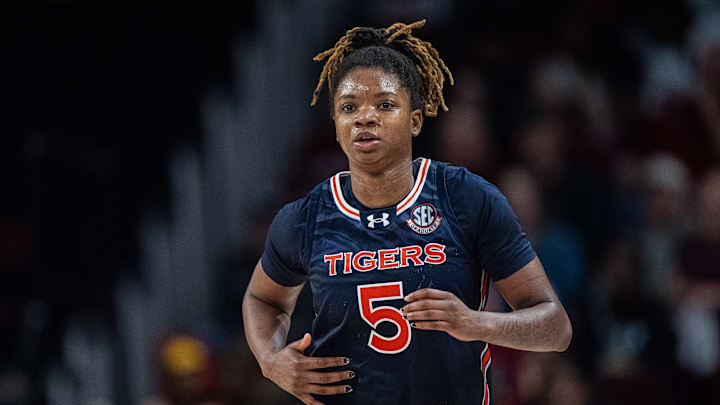The first round of Monday's WNBA Draft was fairly predictable, but the second and third rounds weren't. We saw a number of surprises, like Aaliyah Nye going 13th and players like Texas A&M's Aicha Coulibaly and Washington's Dalayah Daniels getting drafted despite not having much pre-draft hype.
Those surprise risers also led to some surprise fallers. This draft class might have only had a couple of star-caliber players, but it had a number of intriguing role players in it. Some of those players didn't hear their name called and now will have to hope they latch on somewhere with a training camp deal.
Here are the five best players to go undrafted in Monday night's WNBA Draft.
Sedona Prince - TCU
Let's just go ahead and get this one out of the way now.
Sedona Prince was mocked as a first-round pick at various times this season by various outlets, but her draft value plummeted as the actual draft approached. This Katie Barnes piece at ESPN does a good job documenting why, and the existence of that article plus the collective outcry against Prince on social media heading into the draft might have been the final two straws that knocked her out of draft consideration.
If we were talking just about basketball talent, Prince has a place in the WNBA. While she sometimes struggles against more physical bigs, her size and her touch inside make her a threat any time she's down in the post.
But Prince has multiple allegations of domestic abuse from ex-girlfriends and while she hasn't been convicted in any of those cases, the damage has been done. Personally, as someone who tends to believe victims, I would not have drafted Prince if I was a WNBA general manager. It appears — whether through moral objections to rostering her or concerns about the backlash of it — that the real WNBA general managers came to that same conclusion.
DeYona Gaston - Auburn
My guess here is that WNBA general managers didn't trust DeYona Gaston because she was a relatively late breakout.
For the first four years of her career, Gaston was a solid role player at Texas, but she was never really able to break out on a crowded roster, especially after losing her starting role in 2023-24. Ultimately, Gaston chose to spend her final collegiate season at Auburn.
In her new home, Gaston finally delivered star-level results, finishing 12th in the nation in scoring at 21.8 points per game while also adding 7.2 rebounds, 1.1 steals and 1.0 blocks per contest.
Gaston does a good job getting to the basket, shooting more 2-pointers than all but one player in Division I. The question is whether she can do that effectively at the next level still or if she'd need to work on improving as a shooter as well.
Samara Spencer - Tennessee
Despite the team's success last season, no Tennessee player was drafted, though two of them probably could have been.
Let's start with Samara Spencer. The 5-foot-7 point guard had a chance to really showcase her playmaking skills last season, posting career-best numbers in assists and turnovers. Her shooting has been inconsistent in college, but last year saw her knock down a career-high 36.7 percent of her 3-point attempts.
So, why wasn't she drafted? Partly, it's just hard to get a read on her. She spent her first three seasons in a fast-paced Mike Neighbors offense at Arkansas, so there was a little inflation to her scoring numbers. Her size offers concerns about her ability to create her own shots in the WNBA. Can she hold up as a primary or secondary ball-handler against professional defenses?
Jewel Spear - Tennessee
Jewell Spear does a bit of everything well, but concerns about her defensive upside helped knock her out of the draft.
Spear spent the early portion of her career at Wake Forest, where she was asked to do a little too much scoring, leading to worries about her efficiency. She acclimated well to a scaled-back role at Tennessee, though, posting the two best field goal percentages of her college career in her two seasons in Knoxville.
This just seems like a case where teams viewed Spear as a solid role player on offense but too much of a liability on defense to make it into the field of 38 drafted players.
Deja Kelly - Oregon
I'm a long-time fan of Deja Kelly, dating back to covering her when she won a state championship in high school back in 2020, right on the eve of the COVID outbreak.
So, maybe I'm a little biased here. ESPN, for example, ranks Kelly as just the 12th-best undrafted player, but that feels low for the Oregon guard. She isn't necessarily elite at any particular thing, but she's an assertive player who is certainly a top 30 player in this class when she's at her best.
The problem with Kelly is consistency. She can hit big shots, but she also makes things harder than they need to be offensively. She learned to turn down some of the bad shots at Oregon this year, leading to the highest field goal percentage of her career, which happened to be on her fewest attempts since her freshman year. Still, even with a jump in efficiency, Kelly has never shot 40 percent in a season. There's a lot to admire about her game, but there's also not really much evidence that she would excel in a scaled-down offensive role. Kelly is a player who wants the ball in her hands, but there appears to have been concern that she isn't efficient enough to play that kind of role in the WNBA.
The talent was there for Kelly to get drafted. Maybe if she can go overseas and showcase that she's able to spend more time in an off-ball role, she'll find herself in the WNBA next summer.
